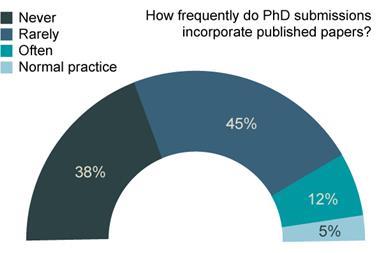Learning to teach while in graduate school does not hinder the research careers of PhDs, a Portland State University team finds
New analysis out of Portland State University (PSU) contradicts the perception that research success is inversely correlated with time spent teaching or learning to teach. The PSU team surveyed more than 330 PhD students and found that those trained in so-called ‘evidence-based teaching’ (EBT), which emphasises interactive, collaborative and hands-on learning instead of the traditional lecture, are just as successful as researchers, if not more so, than their peers without such training.
For these students, who were at least in their second year of a PhD programme in the life sciences, EBT training was associated with an increase in their research productivity, as well as their confidence in their preparedness for a research career and their ability to communicate their research. ‘These results indicate no support for the hypothesised trade-off between pursuing opportunities to learn about EBT practices during graduate school and a student’s research productivity as measured by published papers,’ the PSU researchers concluded.
In fact, their findings actually indicate that the pattern might be just the opposite. ‘For each unit increase in a student’s average training in EBT practices, they were 1.04 times more likely to have at least one additional paper,’ the authors explained.
‘There doesn’t seem to be evidence that if universities invest in training graduate students in 21st century teaching methods, they’re going to be harming their productivity; if anything, they could be benefiting them,’ said study co-author Erin Shortlidge. ‘Graduate students can shift the paradigm moving forward, and take on this national push to be a better teacher as well as a cutting-edge researcher.’












No comments yet